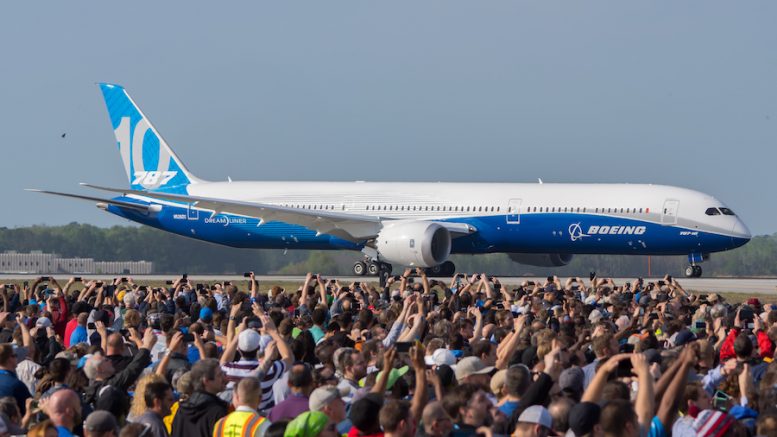Boeing recently announced that all 787 production would be consolidated in Charleston, South Carolina, meaning that 787 production in Everett, Washington would cease. As one can imagine, an announcement of this magnitude generates many opinions and emotions, particularly on the part of the winners and losers. Some pundits see this move as positive while others consider the move complete lunacy. There are legitimate and compelling arguments for consolidation of the 787 production line in Charleston.
In considering the opinion to consolidate operations at one site, the only logical decision was to choose Charleston. Let’s explore this in further detail. The following are some of the considerations for and against, with a splash of personal opinion colored by my experiences.
The Case for South Carolina
The only viable business decision once Boeing decided to consolidate operations is Charleston. Charleston produces the center fuselage for all 787 models supporting both Charleston and Everett final assembly. The 787-10 model which is made exclusively in Charleston is the largest 787 model produced. The center fuselage assembly is too long to be transported on the Dream-Lifter (a modified 747 used to transport large 787 structural assemblies from suppliers to Charleston and Everett).
As such, Charleston is the only site appropriate for producing all 787 models. If the decision were to move all operations to Everett, a significant cost in tooling changes and production philosophy would have been required. For these reasons, Charleston is the best business decision. But there are also other factors that one could argue.
South Carolina is a business-friendly state with a long and proud history in manufacturing, including aircraft manufacturing, overhaul, and maintenance. South Carolinians believe in free enterprise. We are pro-business. In addition to the current Boeing investment, BMW, Mercedes, Volvo, Michelin, and Lockheed Martin all have a significant presence in the state. To support these high-tech companies, South Carolina has developed an excellent supply chain. In addition, the state offers a strong engineering and technical community that will support production and development teams.
In my opinion, South Carolina is home to some of the hardest working men and women in the country. With a strong devotion to family values and loyalty to the companies that care for them, our work force is willing to go the extra mile to achieve greater success. South Carolinians have a strong competitive drive. Our people want to win. Yes, we enjoy our college football and pour energy into support of our local teams. This is driven by the desire for respect and to be the best.
This same energy and enthusiasm continues Monday through Friday in our businesses. Our people want to be the best and will work hard to make Boeing-Charleston a benchmark facility. Because of our strong work ethic, our people are not inclined to depend on unions to support them.
The Boeing Charleston plant has been in operation for more than a decade. I have heard reports from former Boeing colleagues familiar with operations in both Seattle and Charleston that the quality of Charleston work is on par with the factory in Everett, WA. In fact, I am told that some performance metrics indicate that Charleston may be out performing the Seattle factory.
Follow-up Thoughts
What does this mean for Washington State and the future of new Boeing programs? When Boeing decided to consolidate production of the 787 production to one site, the move to Charleston was the correct business choice. However, this move could also be a message to Washington State that the next new aircraft model is less likely to be produced in Everett or Renton. What could contribute to the exodus? The following is strictly my opinion and should be used to spur discussion.
The workforce in the Pacific Northwest may have an inflated view of their capabilities versus other locations across the country. The work force in Seattle has a well-earned proud aircraft heritage. Unfortunately, unmitigated pride can breed arrogance, complacency and an inflated opinion of self-worth.
The Boeing Seattle arrogance is nothing new and has been in existence for decades. Having started my Boeing career at the Boeing Wichita Division (later, Spirit AeroSystems), I know too well this arrogance. Boeing-Wichita was undeservedly disrespected by Boeing Commercial Airplanes in Seattle.
I was fortunate to spend the first half of my Boeing career in Wichita prior to moving to Seattle. The feeling of marginalization in Wichita actually caused Wichita to try harder. I believe the best of Boeing was in Wichita and that the reason was the drive to prove continually their worth to Seattle. Having worked in both locations, I believe my experience allows me to offer an unbiased opinion.
In my work-life experience, I have also learned that aerospace does not have the corner on the high-tech market. There are excellent craftsmen and engineers in industries outside of aerospace that can and do produce world class complex products. In fact, innovation comes through exposure to new ideas and diversity of thought. Arrogance and complacency block new ideas and diversity of thought.
If a people group or organization are arrogant, complacent and have an over-inflated opinion of self-worth, that group will not be competitive. I believe some have fallen into this trap. It’s easy to see examples of this in some of the comments generated when Boeing announced the 787 decision. Don’t get me wrong. I know full well that there are very competent and talented workers in the Pacific Northwest. However, it is important for all of us to keep our success in check.
Conclusions
The 787 consolidation in Charleston was the right decision for all stakeholders if Boeing needed to consolidate to one location. As a part of a healthy industry and economy, business decisions should be made based on competition where the best value solution is chosen. Like any perennial champion, it’s easy to get arrogant and complacent. I like Charleston’s chances to win more aircraft business. I think Boeing would be well served to consider all options when building the next airplane. I also believe Washington State and the Puget Sound workforce should consider their position and work hard to earn the top spot. Don’t rely on your history of championships.
–
 About the author:
About the author:
PAUL V. KUMLER, P.E. (President KTM Solutions, Inc.)
Paul V. Kumler, P.E. is president of KTM Solutions, an engineering company that services the aerospace and large-scale manufacturing industries. In addition to aero structures engineering services, KTM Solutions designs and builds tooling supporting a broad clientele and various industries. The company is headquartered in Greer, South Carolina with remote offices in Charleston, South Carolina. Mr. Kumler serves in several volunteer roles including the SC Aerospace Advisory Board. Mr. Kumler, a professional engineer, is licensed in Louisiana, South Carolina, Texas and Washington. He is married to Ginger A. Kumler and has two grown children and three grandchildren.




Be the first to comment on "787 Move to Charleston – Is This Just The Beginning?"